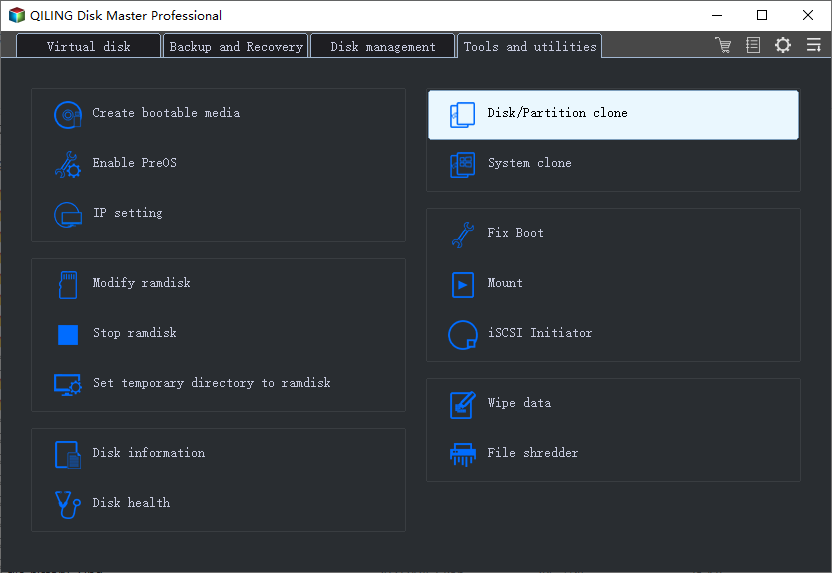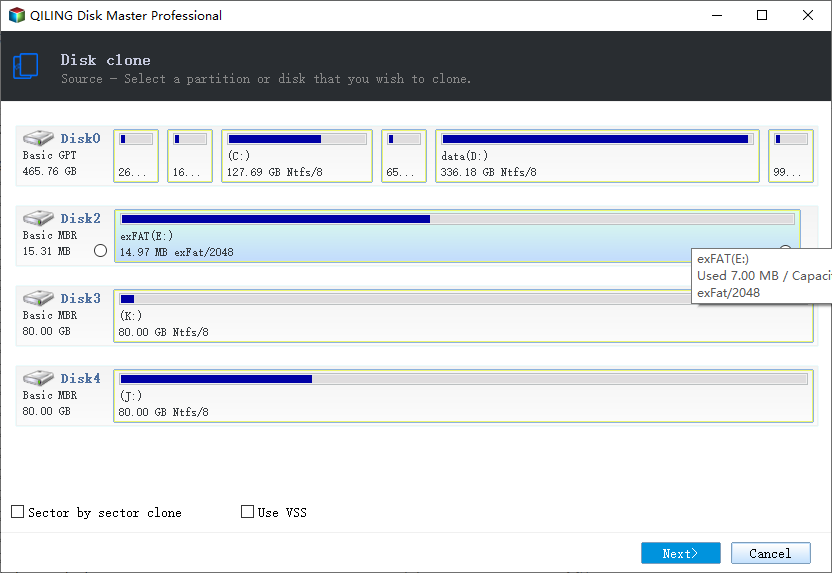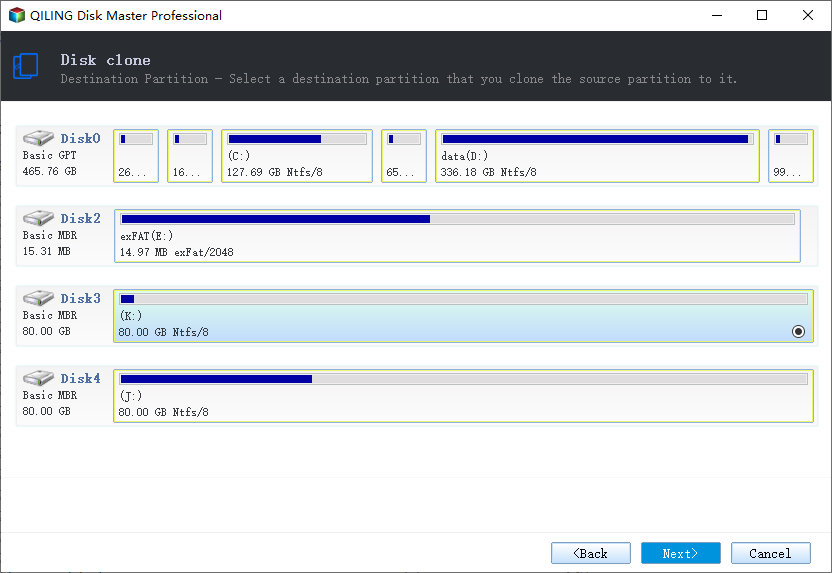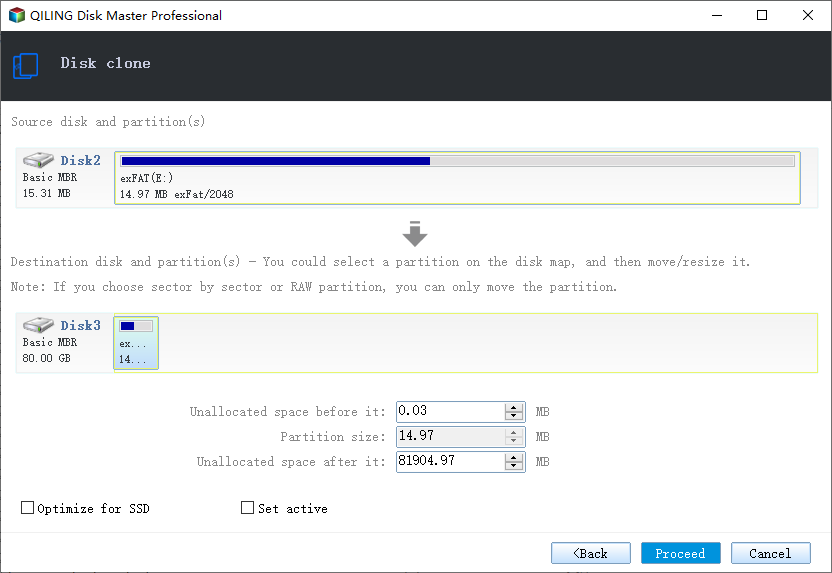How to Clone IDE to SATA HDD/SSD (2 Ways)
"Hi there, do you know how to clone IDE to a SATA as a boot drive? My computer is running slower and slower recently and I'm thinking to migrate OS from the IDE to a SATA SSD without reinstalling Windows, is that possible?"
PAGE CONTENT:
- Part 1. Prepartions for Cloning IDE Disk to SATA HDD/SSD
- Part 2. Clone IDE Disk to SATA HDD/SSD Without Booting Issue
- Furthre Readings: How to Migrate OS from IDE to SATA HDD/SSD
Why Need to Clone IDE to SATA
With the fast spread of SSD, more and more users are upgrading their system disk from HDD to SSD by disk cloning. Most of these disks are SATA drive now.
However, there are some users still using IDE hard drive as their boot drive, which makes it quite inconvenient for them to complete some advanced test or doing some jobs on their PCs. Therefore, IDE users are trying to migrate their system disk, replacing IDE hard drive with SATA HDD or SSD.
SATA vs. IDE
Besides, there are some other reasons which make IDE users want to upgrade IDE disk to SATA HDD/SSD. Here below is a comparison table of SATA and IED, which explains why it's necessary to clone IDE to SATA HDD or SSD:
| SATA | IDE |
|---|---|
|
Created in 2003 Inexpensive, large storage capacity Supports hot-plugging High data transfer rate, up to 6 GB/s Connects directly to the motherboard |
Created in 1986 Doesn't support the latest Windows system such as Windows 10/8 Doesn't support hot-plugging Low data transfer rate, up to 133MB/s |
After cloning IDE to SATA HDD/SSD, you don't need to reinstall the Windows system. Everything on the old IDE disk will be cloned to the new SATA SSD or HDD.
So how to clone IDE to SATA? How to clone IDE hard drive data with Windows system to SATA HDD or SSD without booting issue? Some preparation jobs are needed to be done before cloning the IDE disk to the SATA drive. Let's see now.
Part 1. Preparations for Cloning IDE Disk to SATA HDD/SSD
In order to clone IDE to SATA without reinstalling the system and booting issues, there are some preparation jobs needed to be done in advance.
#1. Check if the computer motherboard support SATA
If the computer motherboard supports SATA, use a SATA cable and a power cable to connect SATA HDD/SSD to your PC.
If the computer motherboard doesn't support SATA, buy an IDE-to-SATA adapter to connect the SATA HDD/SSD to your PC.
#2. Prepare a new SATA hard drive or SSD
If it's a brand new SATA hard drive or SSD, connect it to your computer and initialize it first. See how to initialize a new HDD/SSD:
Connect SATA SSD/HDD to Windows PC via a USB to STAT cable > Open Disk Management and right-click the SATA disk > Select "Initialize Disk" > Set the disk as GPT or MBR.
If it's an used SATA HDD/SSD and you have some data saved on the disk, back up and save the data to another secure location or disk in advance.
#3. Download reliable IDE to SATA cloning software
The last key point that decides the success of IDE to SATA disk upgrading is to choose reliable disk cloning software. Here we would like to recommend you try Qiling Disk Copy which enables you effectively upgrade disk by cloning without losing any data or boot issue.
Once all these preparation jobs are done, you can now start to clone IDE to SATA hard drive or SSD now.
Part 2. Clone IDE Disk to SATA HDD/SSD Without Booting Issue
To clone IDE disk to SATA HDD/SSD without booting issue, all you just need to follow below steps to clone IDE disk data to SATA HDD/SSD without reinstalling system now:
First. Set the SATA drive to IDE mode in BIOS
Step 1. Connect the SATA HDD/SSD to the PC via the SATA cable and power cable or IDE-to-SATA adapter.
Step 2. Restart PC and press F2, F12, Del, etc., keys and release the key to enter BIOS.
Step 3. Got to Advance menu, locate and change SATA Controller Mode to IDE Mode.
The exact menu option in BIOS may differ but look for "SATA Configuration", "SATA Mode", "SATA Controller Mode","SATA Operation", etc. And remember to change the mode from AHCI / RAID to IDE mode.
Step 4. Save the changes and exit BIOS, start-up PC to continue the disk cloning process.
Next. Clone IDE disk to SATA HDD/SSD, upgrade IDE to SATA HDD or SSD
Now you can start the process to clone IDE disk data to SATA HDD/SSD using Qiling Disk Copy with the below tutorial steps:
Note: Before you start, remember to activate this software for a smoothy cloning process from IDE to SATA without any data loss or problems:
Let's see how to upgrade and clone the IDE disk to SATA HDD/SSD without data loss on your own:
Step 1. On Qiling Disk Copy, click "Disk/Partition clone" to start cloning.

Step 2. Select the HDD that you want to clone and click "Next".

Step 3. Select the SSD as your destination.

Step 4. Edit the disk layout and then click "Proceed" to continue.

- Sector by sector clone: Copy as the source option will copy/clone the same layout of partitions on your source disk to the destination disk.
- Edit disk layout allows you to resize or move partition layout on the destination disk manually.
- If your destination disk is an SSD drive, do remember to tick "Optimize for SSD" option if the target is SSD.
A message now appears, warning you that data will be lost. Please confirm this message by clicking "OK".
Last. Set PC to boot from the SATA HDD/SSD
After the cloning process, don't rush to restart the PC. Another more step is needed to be done - setting PC to boot from SATA HDD/SSD via BIOS:
Step 1. Restart PC and press F2, F12, Del, etc., keys and release the key to enter BIOS.
Step 2. Go to the Boot section, set the newly cloned SATA HDD or SSD as the boot drive in BIOS.
Step 3. Save the changes and restart the PC.
After this, your Windows computer will boot from the new disk, and everything is now visible on the SATA disk. If you want to use the IDE disk as a data drive, you can delete the OS partition, clear the whole disk data, and save new data on it.
Further Readings: How to Migrate OS from IDE to SATA HDD/SSD
Some of you may don't want to clone the whole disk data from IDE to SATA, but just want to migrate OS from IDE drive to SATA HDD or SSD. If you have the same needs, you are at the right place.
Here we'll guide you to migrate OS or transfer Windows system only from IDE disk to SATA HDD or SSD with the help of reliable system cloning software - Qiling Backup.
Also, remember to make sure that your computer motherboard supports SATA and prepare a SATA cable and power cable to connect it to your IDE PC. Here are the detailed steps to migrate OS from IDE to SATA HDD/SSD:
Tip
If you are trying to clone a Windows system to a new HDD or SSD disk, empty the disk in advance. One more thing that you can do is to convert your HDD/SSD disk to MBR or GPT - exact the same as your current system disk, which will allow you to effortlessly boot system after cloning Windows system.
Let's see how to clone your current Windows OS to a new HDD/SSD without reinstallation Windows OS now:
Step 1. Connect the new HDD/SSD to your PC
Step 2. Run Qiling Backup to start system cloning
Select "System Clone" on the tool page by clicking the icon at the right top corner.
Step 3. Choose the destination disk - HDD/SSD to save Windows system
Choose the new HDD or SSD as your target disk for saving the cloned Windows system.
Then click "Proceed" to start cloning Windows system to HDD/SSD now.
After this, insert your new HDD or SSD into your computer and reboot PC, change the boot order to set computer boot from new HDD/SSD with cloned Windows 10 system:
Related Articles
- Bad Sector Repair: How to Fix Bad Sectors on HDD in Windows 10/8/7
- 2021 Tips | How to Create Bootable Clone of Windows 10/8/7 Disk to New HDD/SSD
- Upgrade Sony PS4 Hard Drive to Bigger Drive without Reinstallation
- HDD RAW Copy Tool: Upgrade Disk, Copy Disk, Recover Disk
- Hard Disk Backup in Windows 10/8/7 [Beginners' Guide]